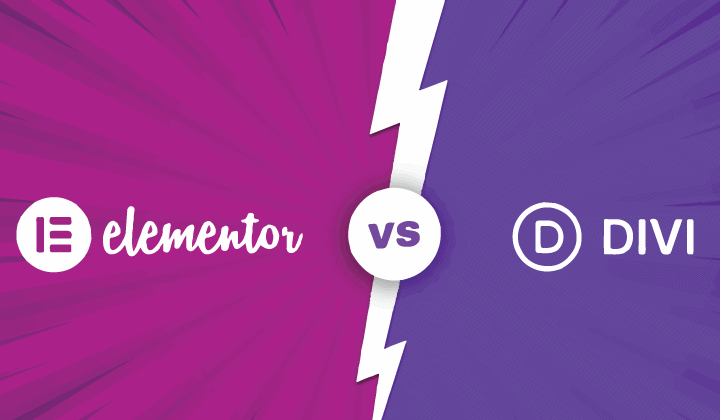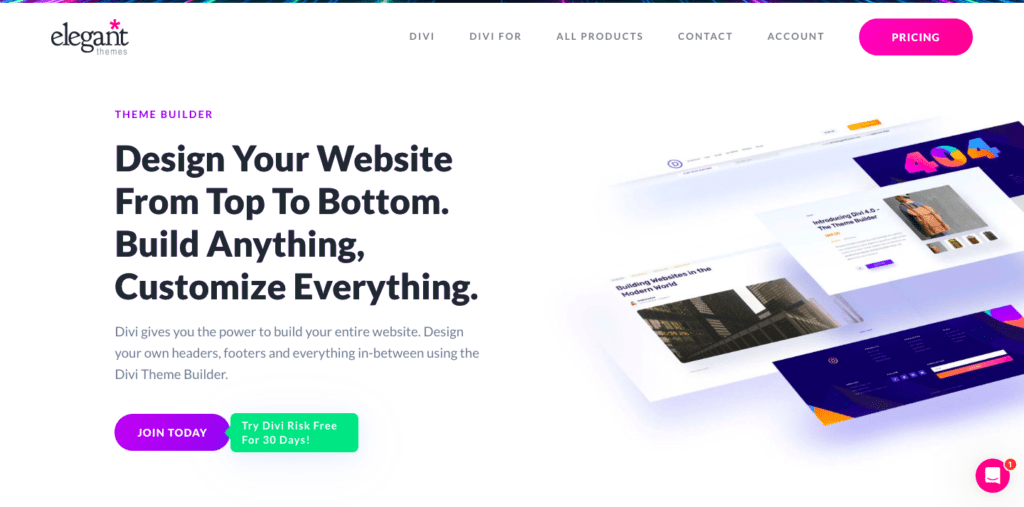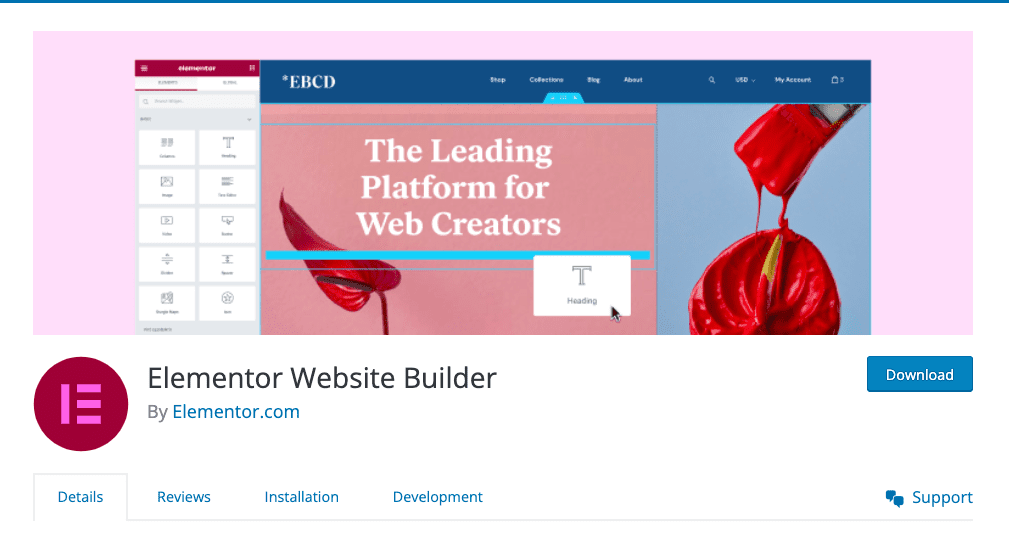Elementor vs Divi: Which One is Better? (2022)
by
7-layers of Security for Your WordPress Site
Your website needs the most comprehensive security to protect it from the constant attacks it faces everyday.

In the world of WordPress page builders, Divi and Elementor are the top contestants. They’re both beginner-friendly, drag-and-drop editors. In spite of both being page builders, they offer slightly different functionality as well.
Additionally, there are so many questions to answer before picking one. Which one is easier to use? Is one faster than the other? Which one has better pre-made design options? This article is an Elementor versus Divi head-to-head comparison of all their features. We’ve covered all the basics you should consider and we will help you make an informed decision by the end.
TL;DR: Elementor is better than Divi because it has more flexible plans, a larger library, and a large community of developers for support. It is also a more intuitive interface for beginners and has more design flexibility as compared to Divi’s hierarchical page structure.
Divi and Elementor are essentially super-powered WordPress themes. You can install the basic theme, and then use the companion plugins to design a complex and custom site. In WordPress, themes control the aesthetics of a site, and the plugins have the functionality. However, they are closely allied, and both Divi and Elementor have used the companion plugins approach to supercharge their themes for design flexibility and customisation.
On the surface of it, both Divi and Elementor are page builder plugins. However, under the hood, there are a lot of nuances that both have. You may prefer the hierarchical system used by Divi, or prefer the full control offered by Elementor, for instance. In the next few sections, we will highlight those nuances to assist you in making the best decision for your site.
Video Tutorial:
Elementor and Divi at a glance
Divi and Elementor are two of the top page builders for WordPress sites. If you’re unfamiliar with either, let’s talk about them:
Divi

Divi by Elegant Themes is actually a theme that comes with a theme builder feature. A subscription with Elegant Themes offers not only the Divi theme but also Monarch, their social sharing plugin, Bloom which is their email opt-in plugin, and an additional theme. The Divi Builder is an easy-to-use, drag-and-drop editor that allows you to create templates for your pages. We have an article that shows you how to use Divi Theme Builder.
Key features
- No coding required
- Responsive designs
- Dynamic content
- Great support
- Easy to follow documentation
- Live editing
Elementor

Elementor comes with an extensive library but is supported by a community of developers that make amazing compatible templates and layouts. It has over 100 widgets that make customizing your entire site a piece of cake. It is the poster child for beginner-friendly editing.
Key features
- Amazing community
- No coding
- Live editing
- Responsive designs
- Easy workflow management
- Large library of templates and widgets
Divi vs Elementor: Summary of Comparison
As you can see, Divi and Elementor are very similar. The table below is a bird’s eye view of all their features.
| Feature | Divi | Elementor |
| Ease of Use | Very little learning curve | More beginner friendly |
| Support | Community Documentation Chat support Blog | 24/7 support Documentation Chat, email, and phone support community |
| Speed | Relatively faster | Relatively slower |
| Modules/Widgets | 63 modules | 30 free & more pro license widgets |
| SEO | Uses shortcodes | Uses clean code |
| Template Library | 350 templates 175 layout packs | 300+ page templates 100+ website kits 50+ widgets |
| Compatibility | Equally compatible | Equally compatible |
| Price | 2 plans – annual or lifetime | 4 plans for different number of sites |
Elementor vs Divi: Head-to-head feature comparison
Divi and Elementor come with their own pros and cons. One may be better than others at certain features. In this section, we talk about the different features you should consider when picking a page builder and dive into the differences and similarities between Divi and Elementor.
Ease of use: Which is easier to use?
Verdict: Divi is better because it allows both frontend and backend editing of a page.
Divi uses a drag-and drop-editor to make editing a page easy. It also has a wireframe view which allows you to edit the page with CSS. So, while most people use only the frontend editor, it’s nice to have the option to edit things on the backend for more technically-inclined designers. Another feature of the Divi Theme Builder is that it has a floating sidebar that appears when you click a module. Divi also offers a split testing feature to test different modules on different versions of the same page.
Elementor also allows you to just drag and drop your widgets, But it does not have a backend editor. Some other differences are that Elementor has a fixed sidebar on the left. On the right, you can preview the changes you’re making live.
The good thing for both is that there are tutorials for everything. They’re both incredibly beginner-friendly and easy to install and navigate.
Support: Which has better support?
Verdict: Equally good support.
They both have active support groups on Facebook and other platforms. They both offer 24/7 support from the developers. They offer live chat and email support as well.
Speed: Which loads faster?
Verdict: Divi is faster than Elementor.
Divi is fast and handles large projects with ease. Divi is faster when it comes to single page loading speeds as well.
Elementor is marginally slower. In the bigger picture, it doesn’t make too much of a difference. All things considered, this is not a deal breaker with Elementor.
Modules and widgets: Which has better widgets or modules?
Verdict: Elementor has more widgets.
Widgets and modules are the building blocks of your site design. Some examples of widgets are Heading, Title, Image, Text, etc. The more the widgets, the more options you have to customise your site.
Divi has 63 modules to choose from including a bunch of WooCommerce-specific ones. Additionally, they offer the option to make some content dynamic. This means that text modules can be made dynamic to create a template that pulls in the actual content from the live site.
Elementor, on the other hand, has 30 free modules/widgets and up to 100 widgets if you have a pro license. You can edit your basic page with the 30 free ones. The pro license is only necessary if you want to use niche widgets like WooCommerce ones.
SEO: Which is more SEO-friendly?
Verdict: Elementor is better with its clean code.
Most page builders come with short codes. Divi is one of them. The problem is that when you deactivate your Divi page builder, your site is left in shambles because of all the broken shortcodes. This affects your site functionality which removes you from the good graces of Google. This in turn impacts your SEO.
Elementor, on the other hand, is focused on clean code. So, even if you deactivate the plugin, your page is left just bare of all the designs. The designs will disappear if you uninstall the plugin. No broken shortcodes that impact its functionality.
Template library: Which has a better template library?
Verdict: Elementor has more options in their library.
Divi offers 350+ page templates and 175 layout packs. They also offer free templates occasionally for their members that are single page layouts for a specific type of business.
Elementor has a larger resource pool of templates. They offer two types: page templates and block templates. The Elementor Pro license unlocks 100+ website kits, 50 widget templates, and offers more customizability. But there are free templates that you can use to build a site.
Compatibility: Do they work with all WordPress themes and plugins?
Verdict: They’re both compatible with WordPress plugins and themes.
They both claim to work with all “well written” code of any WordPress theme or plugin. So, as long as you’re using a popular or commonly used plugin or theme, you’ll be good to go.
Price: Which is better bang for your buck?
Verdict: Elementor has a limited free plan, but Divi winds up being more economical for scale.
Divi has two plans: an annual one for $89 and a lifetime one for $249. The subscriptions offer access to Divi, Bloom, and Monarch. The subscriptions can also be used on an unlimited number of sites. They don’t offer a free license but they do have a free trial for 30 days.
Elementor, on the other hand, has a free version, albeit with limited customisability. They have 4 plans. An Essential plan at $49 a year offers everything you need for one website. An Expert plan is for 25 websites and is at $199 a year. Elementor’s Studio Plan offers the Pro features for 100 websites and costs $499 a year. Lastly, an Agency plan lets you use the features for 1000 websites and costs $999 a year.
Alternatives to Divi and Elementor
If neither Divi nor Elementor seems like the right fit, here are some alternatives:
- Beaver Builder: With over 500,000 users, Beaver Builder is definitely a popular option. It was built by a former WordPress agency that was passionate about creating software that makes designing a site easy and quick.
- SeedProd: It is also a great drag-and-drop page builder with great support for marketing tools, pre-built themes, and much more. There isn’t a free version though.
- Brizy: It promises an intuitive building experience with its React-based interface. The interface is never overwhelmed with all options. Editing is easy and determined by the task at hand. It is the next big thing in the world of WordPress page builders.
- Spectra: A new drag and drop website builder that integrates into the WordPress block editor. It adds new blocks, wireframes, block patterns and templates to the native editor so there’s nothing new to learn. It uses clean code and won’t slow down pages either, which is an added benefit when speed matters.
Other WordPress necessities
With the site design taken care of, here are some of our recommendations for your WordPress site:
- BlogVault: A backup plugin that takes both automated and on-demand backups. Your site is always protected and you can sleep easy with BlogVault.
- MalCare: Scanning and clearing malware has never been easier. Once you’ve installed the plugin, it only takes a few clicks to protect your site from hackers and malware.
- Google Analytics: Being SEO-friendly is key to bringing great traffic to your site. We recommend you use the Google Analytics plugin to monitor your site. We have a tutorial on how to integrate it into your WordPress site.
Final thoughts
Both Elementor and Divi are similar in the way they function. The key differences are the prices and sizes of their libraries. In that regard, Elementor comes out on top. But no matter which page builder you use, we recommend using BlogVault to backup your site. Take a backup before making any changes and your site will be protected.
FAQs
Is Divi faster than Elementor?
Yes. Divi is faster than Elementor. Though, just marginally. So, we recommend you pick whichever one you prefer to use.
Can you use Divi with Elementor?
Yes, you can. You can use Divi with the Elementor theme or vice versa. You can also have them both installed and use them for different pages.
What is better than Elementor?
Elementor is the best page builder option right now. But there are alternatives like Divi, SeedProd, and Brizy.
Is Divi the best page builder?
Divi and Elementor are comparable but Elementor comes out a little ahead with its extensive library and price flexibility.
Is Elementor cheaper than Divi?
Elementor is cheaper because it has a free plan and 4 subscription plans that vary depending on the number of sites you want to use it for. Divi lets you use the product on an unlimited number of sites but has two options: an annual plan and a lifetime plan.
Category:
Share it:
You may also like
![Top 9 ManageWP Alternatives To Manage Multiple Sites Easily [Reviewed]](https://www.malcare.com/wp-content/uploads/2022/12/malcare-default-image.jpeg)
Top 9 ManageWP Alternatives To Manage Multiple Sites Easily [Reviewed]
ManageWP is a popular name in the WordPress maintenance plugins market. People love how much you get for a free plan, how easy it is to set up, and how…

MalCare Proactively Defends Against Icegram Express SQL Injection Vulnerability
MalCare’s recent data has revealed numerous attempts to exploit a newly found SQL injection vulnerability in the Icegram Express plugin. Attackers commonly use this sophisticated SQL injection technique to extract…

Atomic Security’s Deep WordPress Integration Helps Protect Against Core XSS Vulnerability
The recent WordPress core vulnerability is a critical one, primarily because of two reasons. Firstly, it affects the WordPress core itself, which means that every WordPress site is vulnerable to…
How can we help you?
If you’re worried that your website has been hacked, MalCare can help you quickly fix the issue and secure your site to prevent future hacks.

My site is hacked – Help me clean it
Clean your site with MalCare’s AntiVirus solution within minutes. It will remove all malware from your complete site. Guaranteed.

Secure my WordPress Site from hackers
MalCare’s 7-Layer Security Offers Complete Protection for Your Website. 300,000+ Websites Trust MalCare for Total Defence from Attacks.








